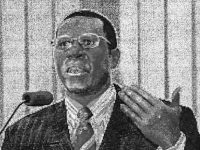BOB GARFIELD: And I'm Bob Garfield. When it comes to serious investigative reporting of criminal activities, news organizations have traditionally worked parallel to, not in collaboration with, law enforcement, lest journalists be viewed as agents of the government, rather than as independent watchdogs, which is why the NBC series To Catch a Predator, in which Dateline joins with police departments to sting pedophiles raised so many eyebrows. But it also captivated viewers, and now it seems NBC News is getting more ambitious still, along the lines of To Catch a War Criminal. In December, according to a story in Wednesday’s New York Times, a news crew showed up on the campus of Goucher College in Maryland looking for a man they believe to be part of the Rwandan genocide. And, once again, the network was not working alone. Former journalist Sanford Ungar is president of Goucher College, and he joins me now. Hey, Sandy, welcome to the show.
SANFORD UNGAR: Thanks, Bob. Good to be with you.
BOB GARFIELD: Before we get to the particulars of this incident, tell me, please, about the professor in question, Leopold Munyakazi. How did he get to Goucher? What does he teach? What’s his story?
SANFORD UNGAR: Leopold Munyakazi is a scholar from Rwanda. He came to us through something called the Scholar Rescue Fund. The Scholar Rescue Fund gets applications from many more people than it supports. It screens them and decides whom it will recommend to various colleges and universities to spend a year or two teaching and, in effect, being sponsored because for one reason or another, wherever they're from around the world, they can't go home because they might be in danger. [LAUGHING] Goucher College decided for the first time to participate in the Scholar Rescue Fund’s efforts this academic year.
BOB GARFIELD: Did you have any inkling that Munyakazi was under suspicion for war crimes?
SANFORD UNGAR: We knew that he was alleged to have, quote, unquote, “controversial views” and that he had given speeches in which he challenged the classic view of events in Rwanda in 1994. He didn't defend any killings of anybody but he said this was more of a civil war than a genocide. So the question was whether, by challenging the view, was this a crime? In our view, having controversial views is a credential for teaching in a college or a university. It’s not something we would object to. We had no idea that there was any accusation against him for actually participating in the genocide.
BOB GARFIELD: Had this been, I don't know, 60 Minutes, you know, even 25 years ago, it certainly wouldn't have been unusual for a TV news magazine to show up in a kind of ambush interview at the culmination of a long investigation that independently determined that the subject was a criminal or in some way up to no good. I mean, that’s kind of standard fare. But there was a twist in this case. NBC was not working alone.
SANFORD UNGAR: Right. NBC News said that they had some concerns about somebody who was working at Goucher who might have been involved in some nefarious activities, and they showed up the next day with the Rwandan prosecutor. [LAUGHS] I know in your introduction before, you said sometimes it appears that the prosecutors are manipulating the media by bringing them along. In this case, I felt like the media were manipulating the prosecutor. You would think if he was coming to this country to finger some alleged war criminals from Rwanda that he would have gone to the Justice Department or the State Department, not typically to a television network. It just didn't inspire confidence that I was dealing with a genuine law enforcement matter, if you know what I mean. [LAUGHS] I thought I was dealing more with a kind of show, and I guess it is a TV show.
BOB GARFIELD: As a former reporter for The Washington Post and host of All Things Considered, I know there must be still a little fire dog in you.
SANFORD UNGAR: [LAUGHS]
BOB GARFIELD: Have you not made some inquiries just to try to satisfy yourself as to the particulars of this case?
SANFORD UNGAR: I attempted to call the equivalent of the attorney general of Rwanda. I did not get a call or an email back. I made contact by email with the chief prosecutor at the War Crimes Tribunal in Arusha, Tanzania, which until December is where Rwandan war crimes cases were being tried. I learned there was no case against Professor Munyakazi there. I also called a woman named Allison Des Forges from Human Rights Watch, who is widely regarded as the international expert on the Rwandan genocide and has testified in Arusha, in Tanzania on some of those cases, and she had never heard of this case against Professor Munyakazi. And, by the way, the indictment was only made known after he had given some of these controversial speeches in the United States.
BOB GARFIELD: Now, NBC News has declined to speak to us, but in fairness, I suppose, we should note that what we are discussing here is the sausage making -
SANFORD UNGAR: [LAUGHS]
BOB GARFIELD: - not the sausage itself, and we have yet to see the results of the reporting. I suppose you will be watching with some interest.
SANFORD UNGAR: Well [LAUGHS], I will. If it ever airs I'll be watching with some interest to see what NBC has to say. But I'm enough of a veteran of the news business to be a little worried about the techniques they've used to get a story.
BOB GARFIELD: All right, Sandy. Well, thank you very much.
SANFORD UNGAR: Happy to do it.
BOB GARFIELD: Sanford Ungar is president of Goucher College outside of Baltimore, Maryland.
